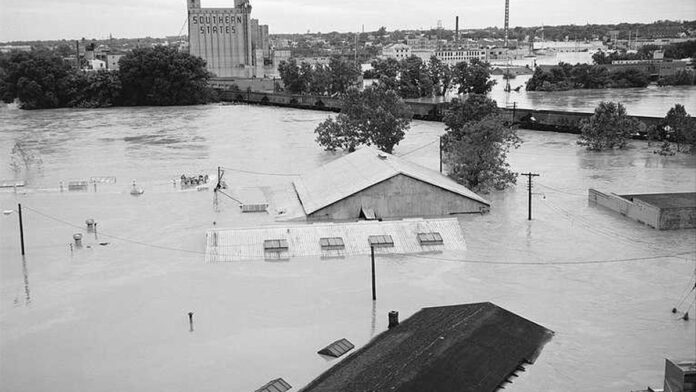Half a century ago, in late June 1972, one of the most devastating and historic hurricanes the United States had experienced formed in the Gulf of Mexico. Hurricane Agnes made landfall as a Category 1 storm and caused significant and widespread damage throughout the Mid-Atlantic.
Rainfall from Agnes caused catastrophic inland flooding, the geographic scale of which had not been seen in decades. Tragically, 128 people lost their lives across eight states, including 50 in Pennsylvania, 21 in Maryland, 14 in Virginia, and one in Delaware. Across the eastern United States, more than 362,000 people were forced to evacuate their homes due to the flooding, including 222,000 in Pennsylvania alone.
As we approach the 50th anniversary of the significant storm and enter Atlantic hurricane season, FEMA is encouraging everyone to learn more about their flood risk and take actions now to be prepared. Even decades later, the stories of Agnes still resonate and can help us be better prepared for the threats of the future. With climate change, extreme rainfall and flooding events are becoming more common, and lessons learned after storms like Agnes will be even more valuable.
“From the expansion of the National Flood Insurance Program, to the focus on mitigation as the cornerstone of community resiliency, to the initial discussion on a need for the Federal Emergency Management Agency, many sweeping changes came in response to those lessons learned from Hurricane Agnes,” said FEMA Region 3 Regional Administrator MaryAnn Tierney. “Reflecting on Agnes, with a focus on the whole-of-community approach to our preparedness and mitigation strategies, will help us be more prepared for the future.”
To recognize this milestone, state-led interagency flood risk management teams, known as the Silver Jackets, of Maryland, New York, Pennsylvania, and Virginia, have collaborated with local, state, and federal partners to participate in upcoming live anniversary events and to create an interactive and comprehensive 50th Anniversary of Hurricane Agnes: Learn from the Past and Prepare for the Future website.
“We are proud of the many partnerships we have across the mid-Atlantic region with agencies who also have a vested interest in reducing flood risk to help protect people and property,” said Col. Estee Pinchasin, U.S. Army Corps of Engineers, Baltimore District commander. “Our district manages 15 dams and oversees nearly 150 miles of levees, which have prevented over $16 billion in flood damage. We will press hard to ensure our flood risk management projects are funded and resourced to monitor conditions and make continual necessary improvements. We will also continue to support and partner with our local communities to provide technical assistance and data to help them make informed decisions to best prepare them for flood risk – both now and into the future.”
The 50th Anniversary of Hurricane Agnes: Learn from the Past and Prepare for the Future website contains visually compelling details and personal accounts about the direct impacts of Hurricane Agnes by state, information about how emergency response has evolved in the past 50 years, and actions people can take to be prepared for hurricanes and flooding.
The website also includes information about flood mitigation efforts in the northeast since Hurricane Agnes, including an interactive map from FEMA Region 3 showing the storm track of Agnes and the location and type of various mitigation projects, as well as locations of USACE-owned flood risk management projects.
Highlights of upcoming events include the following:
- Flood Mitigation Then & Now: 50 Years of Reducing Flood Risk Since Agnes
- Wednesday June 8, 11:00 a.m. – noon via Zoom (all eastern time)
- Register on Eventbrite.
- Agnes caused devastating flooding, but projects in place at the time of the storm significantly reduced its impact. Since Agnes, federal, state and local governments have invested even more to reduce the harm of future floods, but the nature of mitigation is changing. We’ll discuss the history of mitigation at the time of Agnes, what we’ve done since the storm, and how mitigation programs are evolving to overcome increasing challenges.
- Agnes at 50: Learn from the Past. Prepare for the Future.
- Tuesday June 21, 11 a.m. – noon via Zoom
- Register on Eventbrite.
- 50 years later, there are still many lessons to be learned from the impacts of Agnes. During this panel, you’ll hear from a former WYOU news broadcaster who was appointed to be the Luzerne County Civil Defense Public Information Officer during the storm and FEMA Region 3’s Hurricane Program Manager about immediate impacts of Agnes and how this storm compares to others we have experienced more recently.
- Agnes Reflections Facebook Live panel discussion
- Tuesday June 21, 7 p.m.
- Participate here: https://www.facebook.com/events/652058129676775
- The legacy Agnes left behind lives on in the hearts and minds of communities across the Mid-Atlantic region. Join us for this panel discussion about Hurricane Agnes, improvements in flood mitigation and prediction, and discussion on how to prepare for floods of the future.
On June 9, FEMA will also be releasing an episode about the Hurricane Agnes anniversary, including interviews with Agnes survivors, on the agency’s podcast channel.
We all have a role to play as we prepare for, respond to, and recover from disasters, and reflecting on Agnes now will help us be more prepared for the future. Visit Hurricanes | Ready.gov and Floods | Ready.gov to learn more about your risk and act today.

